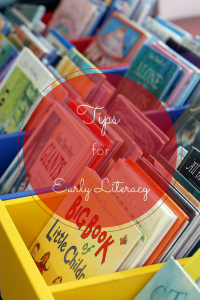 One of the many things about Nannies that makes them special is that they bring a learning environment with them wherever they go. Every day is filled with opportunities to encourage early literacy. Even with a very active, doesn’t-stop-until-he’s asleep-child, early literacy activities can be a natural part of his routine.
One of the many things about Nannies that makes them special is that they bring a learning environment with them wherever they go. Every day is filled with opportunities to encourage early literacy. Even with a very active, doesn’t-stop-until-he’s asleep-child, early literacy activities can be a natural part of his routine.
The word “literacy,” means the ability to read and write. Generally defined by the Richmond Public Library and many others, the term early literacy means: “What children know about reading and writing before they can actually read and write.” Creating a daily habit of early literacy means you are not only creating a familiarity with books and writing, but with words and communication.
Talking with the children you work with will have a huge impact on their communication and language skills. Language is a foundational key to early literacy. Language and literacy skills develop simultaneously in the first formative years of life. Whenever we talk to children, we are actually teaching verbal skills. The first step to a daily habit of early literacy is becoming conscious of this fact. Your every communication with a child of any age is a teachable moment.
11 tips to foster communication in early literacy.
Thanks to CareAcademy.co for this informative article. Reprinted with permission.
